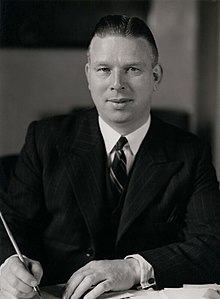|
Arthur Bottomley
Arthur George Bottomley, Baron Bottomley, OBE PC (7 February 1907 – 3 November 1995) was a British Labour Party politician, Member of Parliament and minister. Early lifeBefore entering parliament he was a trade union organiser of the National Union of Public Employees (which later became part of UNISON). From 1929 to 1949 he was a councillor on Walthamstow Borough Council, and in 1945–1946 he was Mayor of Walthamstow. He was appointed an Officer of the Order of the British Empire (OBE) in the 1941 Birthday Honours.[1] Parliamentary careerBottomley was first elected to parliament in the 1945 general election for the Chatham division of Rochester and he held the seat (later renamed Rochester and Chatham) until losing it in the 1959 general election to the Conservative Julian Critchley. He returned to parliament by winning Middlesbrough East in a 1962 by-election and held the seat, and its successor Middlesbrough, until his retirement in 1983. Bottomley was a junior minister in Clement Attlee's governments, being Parliamentary Under-Secretary of State for Dominion Affairs (1946–47), Parliamentary Under-Secretary of State for Commonwealth Relations (1947) and Secretary for Overseas Trade at the Board of Trade (1947–51). In Harold Wilson's governments he was Secretary of State for Commonwealth Relations (1964–66) — during which time he sought to deal with the consequences of Rhodesia's Unilateral Declaration of Independence — and Minister of Overseas Development (1966–67). Announced in the 1984 New Year Honours,[2] he was created a life peer as Baron Bottomley of Middlesbrough in the County of Cleveland, on 31 January 1984.[3] Lord Bottomley died on 3 November 1995 at the age of 88. FamilyHis wife, Bessie Ellen Bottomley (née Wiles), JP, whom he married in 1936,[4] was named a Dame Commander of the Order of the British Empire in 1970 "[f]or public and social services." Bessie Ellen Bottomley died in 1998 in Redbridge, Essex. Publications
References
External links |
||||||||||||||||||||||||||||||||||||||||||||||||||||||||||||||||||||||

